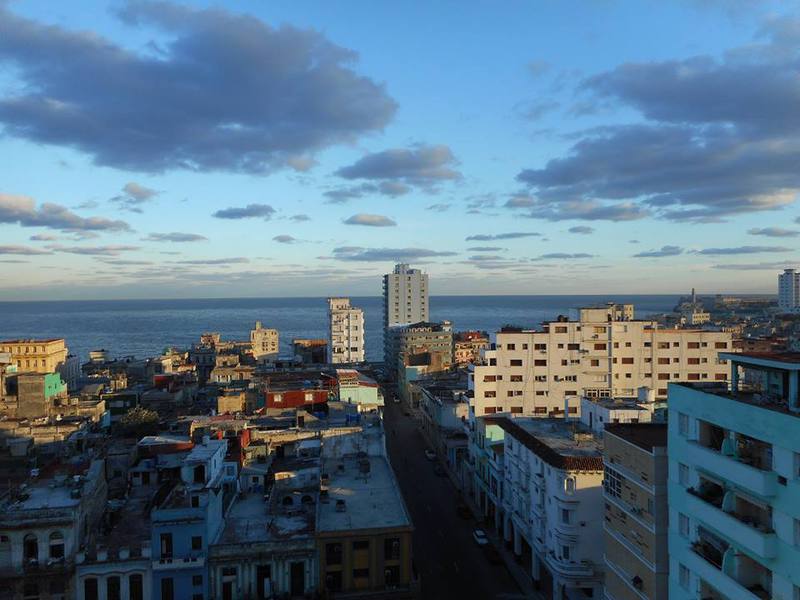Cuba Libre capstone course achieves Essential Studies Program's goal

CHADRON – For a college student who lives in northwest Nebraska, traveling 90 miles is an ordinary occurrence. However, for 10 Chadron State College students and Dr. Deane Tucker and Dr. Thomas Smith, the 90 miles across the Gulf of Mexico to Cuba was anything but conventional.
In fact, Cuba Libre, which is part of the Essential Studies Program’s six-hour capstone requirement, marked the first time a group of Nebraska State College System students pursued academic endeavors on the island of Cuba, one of the world’s final remaining Communist states. Until recently, Cuba and the United States have had an adversarial relationship, but after rounds of discussion, Cuban and U.S. officials are working toward restoring diplomatic relations after a 54-year-old embargo.
When the CSC students and professors arrived in Havana, Cuba’s capital city, Dec. 8, the discussion of restoring diplomatic relations hadn’t been finalized. The news of the budding relationship between Cuba and the U.S., in fact, was announced when the group was flying back to the United States Dec. 17.
Regardless, the CSC students – all 10 majoring in different disciplines – still had a remarkable experience while completing their capstone courses.
“Deane and I felt there might be a time of change occurring in Cuba and we were interested in having our students see a cultural, economic and political system that is worlds away from Nebraska,” Smith said. “Everyone has now heard more about Cuba because of the recent changes being reported in the media. However, the nine days we were there belies the main narrative of the reporting. For example, we didn’t see the inevitability of capitalism as so many news outlets crowed; instead, we saw an autonomous country with some U.S. influence. We saw Cuba as a separate entity and the interactions we had with the Cuban people were very de-politicized.”
For Tucker, a professor of English and Humanities, and Smith, an associate professor for the Social and Communication Arts department, the trip to Cuba was a culmination of almost two years of work and planning behind the scenes.
The idea for Cuba Libre began in 2013 when Smith and Tucker were discussing options for a capstone course. Smith contacted a former colleague, Phil Alldritt of the University of New Mexico-Taos, a veteran of several study abroad trips to Cuba, and with Alldritt’s input, Tucker and Smith began to develop the course.
“Ideally, the capstone brings the undergraduate experience together and Cuba did that for everyone involved,” Tucker said. “It’s culminating and interdisciplinary. Communication, writing, personal and social responsibility, diversity and more were some of the outcomes we were going after. We let the students determine their own projects and they incorporated as many of those skills as they could.”
Once the idea took shape, Tucker and Smith set their sights on obtaining an institutional visa. After a six-month process, the United States Office of Foreign Asset Control granted Chadron State an educational license.
Of course, the trip wasn’t going to be cheap. However, thanks to Alldritt’s connections in Cuba, support from the Chadron State Foundation and the CSC administration, each student’s trip cost about $3,200.
“There’s no way we could have done the trip if we didn’t have the help we did,” Tucker said. “The administration was incredibly supportive of this endeavor.”
So were the students. Before leaving for Cuba, students had to have a major project nearly complete. While they were in Havana, they worked on different aspects of their projects daily. Tucker said they were busy from 7 in the morning to 7 at night. In addition to several tours across the island, Tucker taught about the culture and art of Cuba, while Smith taught history and politics.
“We stayed in a state-run hotel and we were a few of the non-Cubans in the hotel. It wasn’t spring break,” Tucker said. “Even we as professors became students. We weren’t searching for the tourist experience and we got that.”
Tucker and Smith agree the Cuba Libre trip was a success. To them, it accomplishes the goal of the Essential Studies Program and the academic impact and depth of the cultural experience captivated the students.
“We want to continue this, especially now that we can see change and track it. That’s exciting. We can improve the course as we go and want to schedule it every fall,” Smith said. “These Nebraska kids handled it with flying colors they all gained self-confidence. They all learned from it and our student base and the leadership gained from it is for the better.”
—Alex Helmbrecht, Director of College Relations
Category: Campus News


